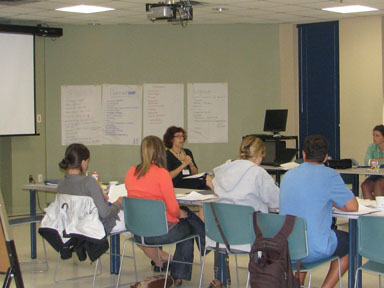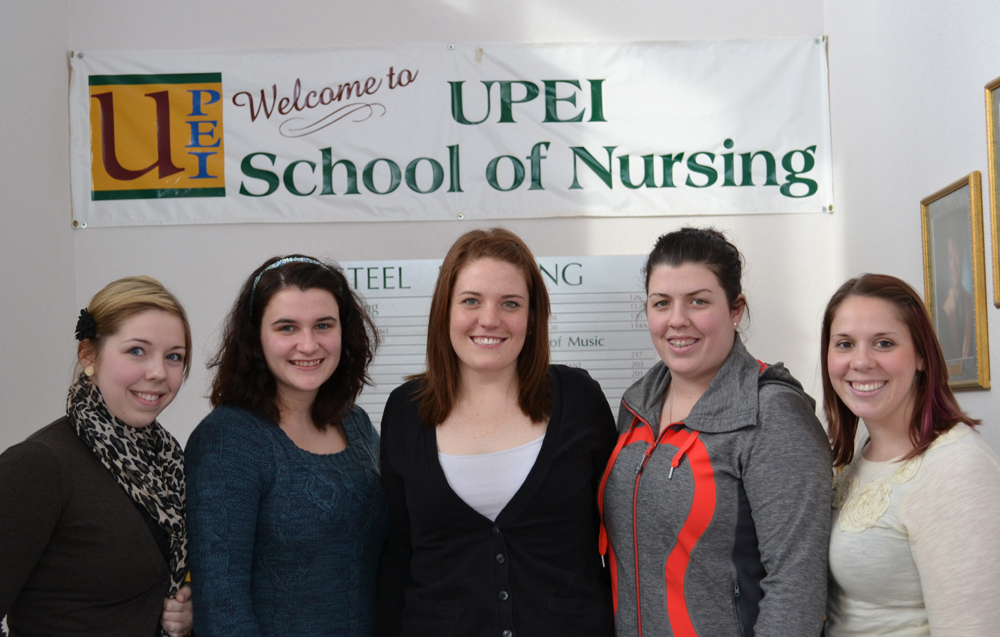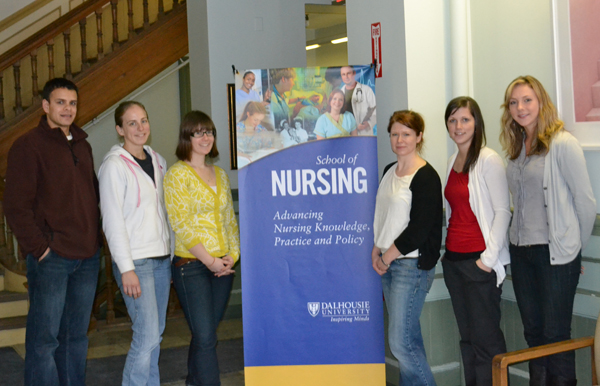
Does Timing of Caregiver Assessment Make A Difference:
Evaluating the Impact with Older Spousal Caregivers of Persons with Cognitive Impairment?
or commonly known as Timing of the C.A.R.E. Tool Project
What is This Research About?
Why Are We Doing This Research?
How Are We Doing This Research?
Who is Involved?
What’s the Latest News?
Our Thanks
Contact Us
What is This Research About?
Through the participation of 100 older spousal caregivers from Nova Scotia and Prince Edward Island, this research project will examine the impact of a caregiver assessment, using the C.A.R.E. Tool, for older spousal caregivers of a partner with cognitive impairment. It also looks at the learning experiences of third-year nurse trainees (Dalhousie and University of Prince Edward Island) as they work with older spousal caregivers in conducting these assessments. The three objectives of this project are:
1. To examine the impact of using the C.A.R.E. Tool on older spousal caregivers of persons with cognitive impairment at different stages of impairment.
2. To examine the impact of the assessment process using the C.A.R.E. Tool on nurse trainees’ (i.e., nursing students) knowledge and attitudes toward caregiving.
3. To identify factors that may influence the development of education about caregivers for nurses and other health care professionals.
The project is funded by the Canadian Institutes of Health Research, Institute of Aging, the Canadian Nurses Foundation, and the Parkinson Society of Canada.
Why Are We Doing This Research?
Timely and comprehensive assessment of caregivers of persons with cognitive impairment may have a profound impact on the type of interventions introduced and their effect on caregivers’ health and well being. Caregiver assessment provides evidence which can contribute to macro-level systems by helping the health system better identify and understand caregivers who are particularly vulnerable for burnout, and to then design and implement interventions to address caregivers’ needs. Caregiver assessment provides the conditions for health care professionals, such as nurses, to obtain information on the global care situation needed to build individual and collective supports for caregivers. It is suggested that a comprehensive psycho-social assessment conducted with caregivers early in their role will have benefits for the caregiver as well as for the health care professionals.
Older spouses are a growing part of the caregiving population and are of particular interest. They face unique risks because of their age and role as a spouse and the situation may be intensified when the partner has cognitive impairment or dementia. Spousal caregivers are not only managing the increasing care needs due to decreasing cognitive function and behavior changes in their partner, but also coping with their own health challenges, the loss of a partner, confidante, and changing social relationships. Research suggests a higher level of loneliness, stress and depression for these caregivers than for those caring for persons with non dementia conditions.
An important component of the project is the involvement of nurse trainees. Their involvement conducting a comprehensive assessment with older spousal caregivers will provide them with a valuable practice-based learning opportunity. They will hear first-hand the experiences of caregivers of persons with cognitive impairment and the realities they face because of their own stage of life, their marital relationship or the unique aspects of the care situation due to the impairment. This information and increased awareness is expected to enhance their current knowledge about the varying stages of cognitive impairment and their current thinking about families and the role they play in the care of older adults with cognitive challenges.
How Are We Doing This Research?
To meet the three objectives of the research project, a number of activities will take place. Below is a description of the research activities related to each objective.
Objective One:
To examine the impact of using the C.A.R.E. Tool on older spousal caregivers of persons with cognitive impairment at different stages of impairment.
Using a sample of older spousal caregivers stratified by stage of their spouse’s cognitive impairment, a pre-post design will be used to understand the impact of the C.A.R.E. Tool on caregivers. The impact of the assessment will be analyzed by conducting a brief semi-structured interview at Time 1, in conjunction with the C.A.R.E. Tool assessment, and a similar interview at Time 2 by telephone 3-5 days later. Interested caregivers will contact the project office to discuss their eligibility and the consent process. Nurse trainees will conduct the first interview and C.A.R.E. Tool assessment at a time and location convenient to the caregiver. The second interview (Time 2) will be conducted by project staff.
Objective Two:
To examine the impact of the assessment process using the C.A.R.E. Tool on nurse trainees’ (i.e., nursing students) knowledge and attitudes toward caregiving.
Similar to the pre-post design for the caregivers, nurse trainees completed a questionnaire prior to their caregiver assessment training, received the training from the researchers, will conduct a number of assessments with caregivers, and then participate in an interview within one month of the end of their participation. It is expected that they will conduct between 5 and 10 assessments as part of their participation. In addition to these data, trainees are recording their experience following each assessment in a semi-structured reflective journal to help understand the impact of this learning opportunity on the knowledge and attitudes of nurse trainees about caregiving.
Objective Three:
To identify factors that may influence the development of education about caregivers for nurses and other health care professionals.
Interviews will be conducted with key informants in the health care field to garner their input on best practices for health care professional training on caregiving. In addition to the input of key informants, the learning from the nurse trainees will contribute to the development of recommendations for caregiving training of health care professionals.
Findings from the research will not only help to determine best practices for the timing of C.A.R.E. Tool with older spousal caregivers, but will also inform the development of caregiver education content for health care professionals.
Click here For more information on the C.A.R.E. Tool
Who is Involved?

Pamela Fancey, Dr. Janice Keefe, Nancy Guberman, Catherine Ward-Griffin
The Research Team
Janice Keefe is the Principal Investigator. Dr. Keefe is a Professor of Family Studies and Gerontology at MountSaint Vincent, and a leading researcher and advocate in the area of caregiving in Canada. She currently holds her second consecutive term as a Canada Research Chair in Aging and Caregiving Policy and is the Director of the Nova Scotia Centre on Aging. Dr. Keefe conducts leading edge care research out her research centre, The Maritime Data Centre for Aging Research and Policy Analysis located at MountSaint VincentUniversity.
Catherine Ward-Griffin is a Professor of the Arthur Labatt Family School of Nursing at the University of Western Ontario, and a Scientist of the Health Outcomes & Health Services Group at Lawson Health Research Institute, London, Ontario. Dr. Ward-Griffin leads an interdisciplinary research team examining the impact of double-duty caregiving and has served on government panels as a consultant on caregiving, best practice guidelines and caregiving policy.
Nancy Guberman is a retired Professor of Social Work with the l’Université du Québec à Montréal and past Scientific Director of the University Affiliated Research Centre on Social Gerontology. Ms. Guberman has led numerous workshops on caregiving with health care professionals, and with colleagues (Keefe, Fancey, & Barylak) has developed the C.A.R.E. Tool. She is also active in caregiver advocacy groups in Quebec and Canada.
Pamela Fancey is the Associate Director of the Nova Scotia Centre on Aging, working as a researcher, educator and advocate for caregiving issues for 20 years. Ms. Fancey has worked on a number of projects which have advanced knowledge about the issues of family caregiving and contributed to provincial policy and program advancements to support family caregivers.


Nurse Trainees
Twelve 3rd year nursing students from two AtlanticUniversities; the Dalhousie School of Nursing and the School of Nursing at the University of Prince Edward Island are employed as Research Assistants. Once a caregiver agrees to participate in the study, these students contact the caregiver to set up a time for the interview and then meet with the caregiver in person to conduct the 1st interview and C.A.R.E. Tool assessment with them. These individuals are:
School of Nursing, Dalhousie University – Katie Wuite, Chris Coxon, Martha Purcell, Santina Rushton, Lauren Haindl, Norma MacDonald, and Jamie Vickers.
School of Nursing, University of Prince Edward Island – Cynthia Trewin, Amanda Perry, Alison Aiken, Brandi Martin, and Hannah Waxer.
The nursing students were required to participate in a training session that prepared them for their work with this project and receive ongoing support and guidance from the research team.
Project Staff

Mary Leslie – Project Manager (Nov 2010- June 2012)
Mary Leslie has a diverse career background, having worked in both the public and private sectors as an educational consultant and administrator. She currently is pursuing a PhD in Education Studies at the University of New Brunswick, with a research interest in the learning needs of family/friend caregivers of older persons.
Mary is responsible for implementing the day-to-day administration of the project, working with agencies for participant recruitment, liaising with nurse trainees and project collaborators, conducting interviews with caregivers and key informants, monitoring data entry and analysis, and assisting with project deliverables. She is the first point of contact for project, and will be very happy to answer any questions about participating in it.
Advisory Committee
The Research Team is supported by a multi-sectoral Advisory Committee that represents organizations responsible for policy and practice at the regional, provincial and national levels. Their role is to provide advice and input on the project’s activities. These organizations are:
-
Alzheimer Society of Nova Scotia
-
Alzheimer Society of Prince Edward Island
-
Caregivers Nova Scotia
-
Continuing Care Services, Capital District Health Authority
-
Continuing Care Division, NS Department of Health & Wellness
-
Geriatric Medicine, Capital District Health Authority
-
Home-Based and Long Term Care, Health PEI
-
Nova Scotia Gerontological Nurses Association
-
Prince Edward Island Gerontological Nurses Association
-
School of Nursing, Dalhousie University
-
School of Nursing, University of Prince Edward Island
-
Seniors and Pensions Policy Secretariat, Human Resources and Skills Development Canada
-
Veterans Affairs Canada
What’s the Latest News?
Project Milestones
Winter 2010
· Research team receives funding from the Canadian Institutes of Health Research, Institute on Aging, the Canadian Nurses Association, and the Parkinson Society of Canada.
Spring 2010
· Project Manager hired
· May – Advisory Committee met
Summer 2010
· August – Research team held two-day training session with eight nurse trainees from Dalhousie University, School of Nursing and the University of Prince Edward Island, School of Nursing at Mount Saint Vincent University.
· August – Research team held in person team meeting.
· Submitted ethics applications to Mount Saint Vincent University, University of Prince Edward Island and the Capital District Health Authority for approval to conduct this research project.
· Ethics application approved by Mount Saint Vincent University.
Fall 2010
· Ethics application approved by University of Prince Edward Island and the Capital District Health Authority.
· October – Research team held training session with four nurse trainees from Dalhousie University, School of Nursing.
· November – Advisory Committee met.
· November – Project Manager changed, Graduate Research Assistant started.
Winter 2011

Cynthia Trewin; Alison Aiken; Hannah Waxer; Amanda Perry; Brandi Martin
· January 2011 – Principal Investigator, Dr. Keefe, meets in person with nurse trainees from UPEI School of Nursing.

Chris Coxon; Jaime Vickers; Lauren Haindl; Norma MacDonald; Katie Wuite; Martha Purcell (missing from photo: Santina Rushton)
· February 2011- Principal Investigator, Dr. Keefe, meets in person with nurse trainees from Dalhousie School of Nursing.
· March 2011 -Ethics application amended and approved by Mount Saint Vincent University, University of Prince Edward Island and Capital District Health Authority.
· April 2011 – Recruitment sites/sources expanded. Project team says farewell to Martha Purcell (nursing student at Dal) who is unable to continue with the project into the spring.
· May 2011 – Advisory Commitee met in May AND Click here to read the latest newspaper article from the Journal Pioneer in Prince Edward Island that profiles Dr. Keefe and one of the nursing students from UPEI.
· June 2011 – Caregiver participation increased significantly. Project team says farewell to Hannah Waxer (nursing student at UPEI) who is unable to continue with the project into the summer. Graduate research assistant changed.
· Summer 2011- Co-investigator, Pam Fancey, meets in person with nurse trainees from Dalhousie and UPEI. Recruitment of caregivers continues. Interviews begins with key informants regarding education on caregiving for health care professionals.
· Sept 2011 – Rejuvenated promotion of the study underway to recruit caregivers. Coding framework for student journals developed.
· Oct 2011 – Interviews with key informants continue. Research team meets in Ottawa. Response from caregivers increases.
· Nov 2011 – 1st release of study results on caregiver-focused education for health care professionals at Alzheimer Society of Nova Scotia conference in November.· Dec 2011- An article on the project was published in the Journal Pioneer. Click here to read. Advisory Committee met in December to discuss project progress, review presentation given to Alzheimer Society of Nova Scotia and identify potential dissemination strategies and venues for project’s findings.
· January 2012 – We are on the home stretch with achieving our goal of completing interviews with 100 older spouse caregivers.
· Feb-March 2012 – Nurse trainees wrap up their involvement with the project. Interviews are conducted with them to understand the impact of conducting assessments with caregivers has had on their understanding and awareness of caregivers’ situations.
· April – May 2012 – Principal Investigator, Dr. Janice Keefe meets in person with nurse trainees from Dalhousie University and UPEI to provide preliminary results.
· June 2012 – Research Team held in-person team meeting to discuss preliminary results and workplan for dissemination activities.
· July – Dec. 2012 – Research team analysing data and preparing project deliverables.
· February 2013 – Dr. Janice Keefe to share study results at Geriatric Rounds, QEll, Halifax.
· March 2013 – Co-investigator Nancy Gubermen and Pamela Fancey to share study results at American Society on Aging Conference, Chicago.
· July 2013 – Health Care Professionals’ Education About Family Caregiving Consultation Results and Planning for Action is now available online by clicking here or in print form by contacting caretool@msvu.ca or calling (902) 457-6546.
More to come…
Achieving Our Target of Working With 100 Spousal Caregivers – WE DID IT!
| 2010/2011/2012 | Oct-Dec | Jan-Mar | Apr-Jun | July – Sept | Oct-Dec | Jan-March | Total Required |
| # of Caregivers Interviewed | 13 | 14 | 14 | 12 | 21 | 26 | 100 |
| % of Caregivers Interviewed out of Total Required | 13% | 27% | 41% | 53% | 74% | 100% | 100% |
Our Thanks
We would like to sincerely thank the organizations who are helping with this research, the nursing students from Dalhousie University and University Prince Edward Island, and especially the caregivers who generously gave of their time to participate in this study.
Janice, Nancy, Cathy & Pam
Contact Us
Timing of the C.A.R.E. Tool Project
c/o Nova Scotia Centre on Aging
Mount Saint Vincent University
166 Bedford Highway
Halifax, Nova Scotia B3M 2J6
Email: caretool@msvu.ca or nsca@msvu.ca
Phone: 902-457-6546